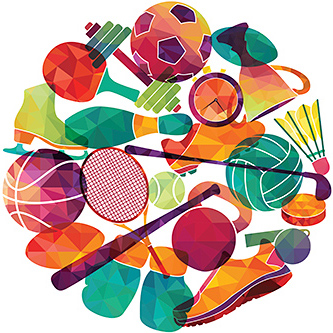As we discussed last issue in part 1 of this article, when athletes are faced with injury, the effects can take a mental toll. What can you do to help your athletes when faced with these mental challenges? Here are more tips provided by professional sports chiropractors.
Encourage a Focus on Recovery
"Dealing with an unexpected injury can certainly be a challenge to any athlete's identity, whether high school or professional," says Karen Slota, BS, DC, team chiropractor for the Detroit Lions.
This involves getting them to concentrate on things like managing inflammation, soft-tissue recovery, restoring strength, and improving flexibility. "Luckily for many of my athletes, we have the ability to work with a great team of professionals that all provide their expertise in these areas to reinforce the path of recovery for the athlete," Dr. Slota says.
Set Realistic Expectations
"For the pro athlete, I want to set realistic expectations to their injury," says Hirad Najaf Bagy, DC, team chiropractor for the Washington Redskins, Washington Nationals, and D.C. United pro soccer team. "I try to draw a picture for them what their injury is, what science tells us about their recovery, and what it means."
In addition to setting realistic expectations, Dr. Najaf Bagy stresses that it's also important to continually re-evaluate. This helps the athlete "wrap their head around their injury," he says, which can go a long way with keeping them motivated and positive, providing a better recovery as a result.
Communicate Clearly
"From the standpoint of a DC, and without the intervention of a Sports Psychologist, I believe that the most important way to keep the athlete mentally focused and motivated throughout the course of rehabilitation from an injury stems solely from clear and concise communication," says Beau Daniels, DC, official chiropractor for the Los Angeles Rams.
"Making sure the athlete fully understands their injury, what to expect in the coming weeks, and what to expect regarding a return-to-play timeline is crucial to keep them focused on the growth they need to return to sport," he says. "Athletes are very in tune with their bodies and unless you take the time to explain to them what they are feeling and how these feelings will change over time, you get a very confused and deflated athlete."
Don't Be Afraid to Be Honest
"I think the best way that a sports chiropractor can help their athletic patients mentally is just being honest with them," says Stuart E. Yoss, DC, CCSP, ART, team chiropractor for the Chicago Blackhawks, Bears, and Bulls. "The more you can tell the athlete what to expect also tends to allay any fears that they may have about being injured."
Granted, this isn't always an easy thing to do. "There are times that you will have to tell a patient their season is over or that they will have to miss the big game," Dr. Yoss says. "Those are some of the worst times being a doctor. To see that look in their eyes is rough."
Remind Them They Aren't Alone
"Most professional athletes have been on a consistent training program since they were very young," says Mary Collings, DC, team chiropractor for the NHL's Dallas Stars and NBA's Dallas Mavericks. "So, when sidelined by an injury it is very difficult for them to know what to do each day and they feel somewhat 'left out' from the rest of the team."
Dr. Collings explains that to help with this, there is value in reminding them that they aren't the only one with this type of issue. "I always try to let them know that there is at least one other player out there with the same type of injury with a similar recovery time," she says, adding that, "sometimes when they realize they aren't alone, it makes it better."
Editor's Note: Part 1 of this article appeared in the September issue.
Click here for more information about Spencer Baron, DC, DACBSP.
Click here for more information about Christina DeBusk.





